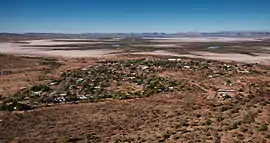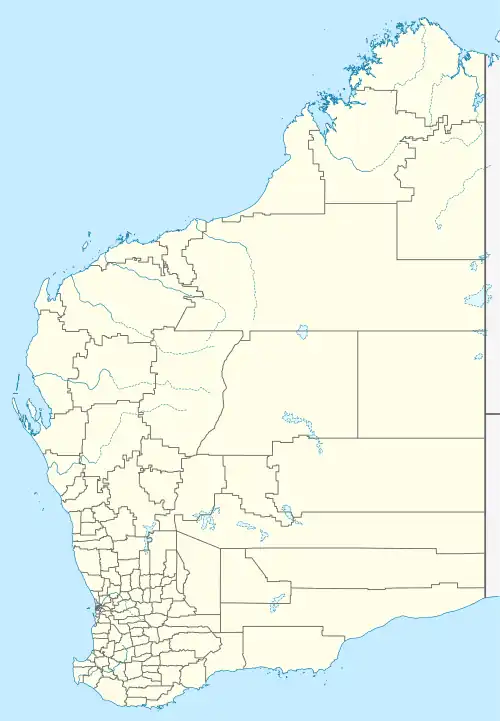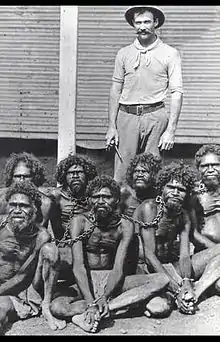| Wyndham Western Australia | |||||||||
|---|---|---|---|---|---|---|---|---|---|
 Wyndham's Three Mile area, looking south to the King River | |||||||||
 Wyndham | |||||||||
| Coordinates | 15°28′57″S 128°7′22″E / 15.48250°S 128.12278°E | ||||||||
| Population | 745 (UCL 2021)[1] | ||||||||
| Established | 1886 | ||||||||
| Postcode(s) | 6740 | ||||||||
| Elevation | 11 m (36 ft) | ||||||||
| Area | 936.1 km2 (361.4 sq mi) | ||||||||
| Location | |||||||||
| LGA(s) | Shire of Wyndham-East Kimberley | ||||||||
| State electorate(s) | Kimberley | ||||||||
| Federal division(s) | Durack | ||||||||
| |||||||||
Wyndham is the northernmost town in the Kimberley region of Western Australia, 3,315 kilometres (2,060 mi) northeast of Perth via the Great Northern Highway. It was established in 1886 to service a new goldfield at Halls Creek, and it is now a port and service centre for the east Kimberley with a population of 941 as of the 2021 census.[2] Aboriginal and Torres Strait Islander people make up 54% of the population. Wyndham comprises two areas - the original town site at Wyndham Port situated on Cambridge Gulf, and 5 kilometres (3.1 mi) by road to the south, the Three Mile area with the residential and shopping area for the port, also founded in 1886.[3] Wyndham is part of the Shire of Wyndham-East Kimberley.
History


Wyndham is within traditional Doolboong country.[5]
The first European to visit the area was Phillip Parker King in 1819. He was instructed to find a river "likely to lead to an interior navigation into the great continent". He sailed into Cambridge Gulf, which he named after the Duke of Cambridge, and then sailed up a river which was subsequently named after him. Finding no fresh water on the mudflats, he departed.
Wyndham was established on 14 April 1886, by government resident and warden Charles Danvers Price,[6] who led a party including commissioner of crown lands John Forrest on the Adelaide Steamship Company mail steamer SS Albany.[7][8]
Price selected Wyndham as the name for the new town, after Walter George Wyndham, the young stepson of the governor of Western Australia Sir Frederick Napier Broome.[9][10]
By late-1886, the town was booming and there were three hotels at the port, one of which was a two-storey building, and two taverns at Three Mile Camp, as well as stores, bootmakers' and butchers' shops, a billiard room, a soda water factory, commission agencies, auctioneers and other businesses.[11][3] Ships brought in at least five thousand miners, who headed off to the Halls Creek goldfields. During this boom there were times when up to 16 vessels were moored in Cambridge Gulf.
However, by 1888, the gold rush at Halls Creek had ended and the fortunes of Wyndham declined. It became a tiny settlement serving the pastoral interests in the East Kimberley. By 1912, money had virtually disappeared from the Wyndham economy, and purchases were paid for using promissory notes known as "shinplasters".
In 1942, during World War II, the town and its aerodrome were attacked on four occasions by Japanese aircraft.
Wyndham's significance as a service centre was crucial for the construction of the Ord River Diversion Dam and the town of Kununurra in the early 1960s. With the rise of Kununurra as a larger population centre, the significance of Wyndham as a service centre had diminished by the 1980s. Wyndham has regained significance as the port for the region with new mines shipping ore from the port.
Wyndham Meatworks
In 1913, the Western Australian government started to construct the Wyndham Meatworks to restart the town's economy. The construction efforts were interrupted by the Nevanas affair and World War I, but the meatworks were completed in 1919 to a design by William Hardwick, who later became the Principal Architect of Western Australia.[12] The meatworks were the mainstay of the town's economy until their closure in 1985; the town also supported the Air Beef Scheme, which ran from 1947 to 1965.[13][14]
Geography
Wyndham is on the eastern side of Cambridge Gulf, an inlet of Joseph Bonaparte Gulf in the Timor Sea. It is surrounded by the Durack, Pentecost and King rivers to the south, Forrest River to the west and Ord River to the north. Much of the land around Wyndham is inhospitable, and includes the Bastion Range and the mudflats of the Cambridge Gulf. The Bastion Range is the site of the 28-square-kilometre (11 sq mi) Wyndham Important Bird Area, identified as such by BirdLife International because it holds the largest known population of endangered Gouldian finches.[15]
Climate
Wyndham experiences a hot semi-arid climate (Köppen climate classification BSh), being a little too dry to be classified as a tropical savanna climate (Aw), with a wet season from late November to March and a dry season from April to early November. The hottest month is November with an average maximum temperature of 39.5 °C (103.1 °F), and the coolest month is June with an average maximum of 31.0 °C (87.8 °F). The annual average maximum temperature is 35.6 °C (96.1 °F), one of the highest in Australia. In 1946, Wyndham recorded 333 consecutive days of temperatures over 32 °C (90 °F).[16] The wet season is very humid with the average dewpoint temperature at 3pm in February being 22.4 °C (72.3 °F). In the dry season, in August, it is 8.3 °C (46.9 °F).
Large rain events do occur in Wyndham, such as on 4 March 1919 when 318 millimetres (12.5 in) of rain were recorded over a 24-hour period, followed by another 117 millimetres (4.6 in) the next day.[17]
| Climate data for Wyndham | |||||||||||||
|---|---|---|---|---|---|---|---|---|---|---|---|---|---|
| Month | Jan | Feb | Mar | Apr | May | Jun | Jul | Aug | Sep | Oct | Nov | Dec | Year |
| Record high °C (°F) | 44.7 (112.5) |
44.0 (111.2) |
43.6 (110.5) |
41.6 (106.9) |
38.8 (101.8) |
36.9 (98.4) |
37.6 (99.7) |
39.6 (103.3) |
41.7 (107.1) |
45.0 (113.0) |
46.0 (114.8) |
45.4 (113.7) |
46.0 (114.8) |
| Mean daily maximum °C (°F) | 36.9 (98.4) |
36.0 (96.8) |
36.0 (96.8) |
35.8 (96.4) |
33.5 (92.3) |
31.0 (87.8) |
31.2 (88.2) |
33.5 (92.3) |
36.7 (98.1) |
38.8 (101.8) |
39.4 (102.9) |
38.1 (100.6) |
35.6 (96.0) |
| Daily mean °C (°F) | 31.6 (88.9) |
30.9 (87.6) |
30.7 (87.3) |
29.7 (85.5) |
27.1 (80.8) |
24.3 (75.7) |
24.1 (75.4) |
26.1 (79.0) |
29.7 (85.5) |
32.3 (90.1) |
33.3 (91.9) |
32.6 (90.7) |
29.4 (84.9) |
| Mean daily minimum °C (°F) | 26.3 (79.3) |
25.9 (78.6) |
25.5 (77.9) |
23.6 (74.5) |
20.6 (69.1) |
17.5 (63.5) |
16.9 (62.4) |
18.8 (65.8) |
22.8 (73.0) |
25.7 (78.3) |
27.1 (80.8) |
27.0 (80.6) |
23.1 (73.6) |
| Record low °C (°F) | 20.1 (68.2) |
21.1 (70.0) |
19.0 (66.2) |
15.7 (60.3) |
10.5 (50.9) |
8.3 (46.9) |
9.0 (48.2) |
10.4 (50.7) |
13.5 (56.3) |
17.6 (63.7) |
18.6 (65.5) |
18.6 (65.5) |
8.3 (46.9) |
| Average rainfall mm (inches) | 185.7 (7.31) |
210.1 (8.27) |
158.6 (6.24) |
36.0 (1.42) |
8.4 (0.33) |
3.9 (0.15) |
3.1 (0.12) |
0.0 (0.0) |
4.0 (0.16) |
22.7 (0.89) |
56.4 (2.22) |
156.1 (6.15) |
845 (33.26) |
| Average rainy days | 14.4 | 14.9 | 11.0 | 3.4 | 1.0 | 0.5 | 0.2 | 0.0 | 0.5 | 2.8 | 6.5 | 11.2 | 66.4 |
| Average afternoon relative humidity (%) | 50 | 53 | 47 | 34 | 29 | 26 | 24 | 24 | 27 | 31 | 36 | 43 | 35 |
| Source: Bureau of Meteorology[18] | |||||||||||||
Facilities
Education
There are two schools, Wyndham District High School (K-12) and St Joseph's Catholic School (K-7), one TAFE campus, and a daycare centre.
Transport
Wyndham is served by Wyndham Airport.
Community
The Wyndham Memorial Swimming Pool is a public swimming pool,[19] opened on 5 November 1966 by Charles Court.[20]
The Ted Birch Memorial Youth and Recreation Centre is a multi-purpose, community recreation facility. The centre, originally the Wyndham Recreation Centre, was opened on 11 October 2003 by the shire president Barbara Johnson.[21] The Centre was renamed on 29 May 2014 in honour of Pastor Edward "Ted" Birch, who was instrumental in helping establish a youth service in Wyndham.[22][23][24]
Peter Reid Memorial Hall is a community hall in Wyndham available for community events and private bookings. The hall, originally the Wyndham Hall, was built in 1982 and was later renamed the Peter Reid Memorial Hall in recognition of Peter Reid's service to the community by the Wyndham Lions Club, following his death in 1985.
The Wyndham Port Shire Hall is a historic building that was constructed in 1960 on the foundations of the original school and road board buildings from 1894. The Hall was also an office and administration building for the Shire of Wyndham-East Kimberley and later a recreation space until it was converted into an art gallery in 1997. The hall became known as the Boab Art Gallery and showcased artworks by local and regional artists.[25] The Hall is now leased to a community group to support the conservation of the Gouldian finch, a rare and endangered bird species that live in the mangroves near Wyndham.[26] The hall is also a part of a heritage walk of Wyndham Port.
Wyndham is also the home of the Big Crocodile, a wire and concrete statue of a crocodile around 18 metres (60 ft) long.
Tourism
For tourists, there are two hotels and a caravan park. The nearby Bastion lookout provides sweeping vistas of the surrounding country, including the Durack, Pentecost, King, Forrest and Ord Rivers, which emerge into the Cambridge Gulf. The town has a museum in the old courthouse that is open to the public and run by the Wyndham Historical Society. Nearby Wyndham is the Boab Prison Tree.
In popular culture
The Wyndham area was a filming location for:
- The 1946 film The Overlanders[27]
- The 1997 documentary film The Human Race
- The 2004 US reality TV series Outback Jack, at El Questro Station[28]
- The 2007 Dutch reality TV series Outback Jack, at Home Valley Station[29]
- The 2008 film Australia[30]
- The 2010 film Mad Bastards, as the fictional town of Five Rivers[31]
- The 2012 film Satellite Boy, in and around Wyndham[32]
- The 2013 TV series Who Do You Think You Are?, Series 5 Episode 1, Rove McManus[33]
- The 2018 TV series Mystery Road, as the fictional town of Patterson[34]
References
- ↑ Australian Bureau of Statistics (28 June 2022). "Wyndham (urban centre and locality)". Australian Census 2021.
- ↑ Australian Bureau of Statistics (28 June 2022). "Wyndham (WA)". 2021 Census QuickStats. Retrieved 30 June 2022.
- 1 2 "Wyndham Notes". The West Australian. Perth, WA. 3 November 1886. p. 3. Retrieved 10 April 2020.
- ↑ "Australian Aborigines in chains at Wyndham prison, 1902". Rare Historical Photos.
- ↑ "AIATSIS map of Indigenous Australia". Australian Institute of Aboriginal and Torres Strait Islander Studies. 18 May 2018. Retrieved 7 June 2018.
- ↑ "News and Notes". The West Australian. Perth, WA. 31 December 1885. p. 3. Retrieved 20 June 2018.
- ↑ "The Cambridge Gulf Expedition". The Daily News. Perth, WA. 29 March 1886. p. 3. Retrieved 10 April 2020.
- ↑ "The Cambridge Gulf Expedition". The West Australian. Perth, WA. 13 May 1886. p. 3. Retrieved 20 June 2018.
- ↑ "General News". The Inquirer and Commercial News. Perth, WA. 17 March 1886. p. 4. Retrieved 10 April 2020.
- ↑ "Government Gazette". The Inquirer and Commercial News. Perth, WA. 17 March 1886. p. 4. Retrieved 19 June 2018.
- ↑ "News and Notes". The West Australian. Perth, WA. 4 March 1887. p. 2. Retrieved 10 April 2020.
- ↑ "Mr W.B. Hardwick – Dead – Former Principal Architect". The West Australian. 2 October 1941. Retrieved 6 May 2012.
- ↑ Patching, G. H (1960), Wyndham meatworks : a study of its past and present problems, retrieved 28 January 2012
- ↑ Elliott, Grant; Western Australia. Dept. of Regional Development and the North West; Western Australia. Dept. for Community Services (1986), The social impact of the closure of the Wyndham meatworks on the town of Wyndham : a report and recommendations, G. Elliott, retrieved 18 August 2022
- ↑ BirdLife International. (2011). Important Bird Areas factsheet: Wyndham. Downloaded from "BirdLife International - conserving the world's birds". Archived from the original on 10 July 2007. Retrieved 21 November 2012. on 3 December 2011.
- ↑ Thompson, Michael. "The Kimberley, Western Australia". Climate and Weather Atlas of Australia. Archived from the original on 13 November 2007.
- ↑ "Adelaide deluge". The Daily News. National Library of Australia. 7 February 1925. p. 16. Retrieved 16 February 2013.
- ↑ "Climate statistics for Australian locations: Wyndham Post Office". Bureau of Meteorology. Retrieved 22 April 2014.
- ↑ "Recreation facilities". Shire of Wyndham-East Kimberley. Retrieved 6 September 2021.
- ↑ The Wyndham Memorial Swimming Pool (Plaque outside swimming pool). Wyndham Swimming Pool located at 12 Civic Way, Wyndham: Shire of Wyndham-East Kimberley. 1966.
{{cite sign}}: CS1 maint: location (link) - ↑ Wyndham Recreation Centre (Plaque outside Centre). Civic Way, Wyndham: Shire of Wyndham-East Kimberley. 2003.
- ↑ Walsh, Rourke (6 April 2014). "Centre to carry late pastor's name". The West Australian. Retrieved 6 September 2021.
- ↑ "Council Minutes Decision to change Centre name". Shire of Wyndham-East Kimberley. 25 March 2014. Retrieved 6 September 2021.
- ↑ Ted Birch Memorial Youth and Recreation Centre (Plaque inside Centre). Civic Way, Wyndham: Shire of Wyndham-East Kimberley. 2014.
- ↑ "Wyndham Port Shire Hall". Heritage Council of Western Australia. Heritage Council of Western Australia. 1 January 2017. Retrieved 17 April 2023.
- ↑ "Save The Gouldian Fund". Save The Gouldian Fund. Save The Gouldian Fund. 1 January 2022. Retrieved 17 April 2023.
- ↑ "The Overlanders". Cultural Atlas Australia. University of Queensland. 2012. Retrieved 18 June 2018.
- ↑ Fabry, Karin (30 July 2004). "Dating Down Under". Ocala Style. Ocala, Florida: Magnolia Media Company. Retrieved 18 April 2019.
- ↑ "Reality of outback for television glamour girls" (PDF). Home Valley Station. 26 August 2007. Retrieved 18 June 2018.
- ↑ "Australia". Cultural Atlas Australia. University of Queensland. 2012. Retrieved 18 June 2018.
- ↑ Mills, Vanessa (19 April 2011). "Mad Bastards movie premiere". ABC Kimberley. Kununurra, Western Australia. Retrieved 7 June 2018.
- ↑ "Satellite Boy". Cultural Atlas Australia. University of Queensland. Retrieved 18 June 2018.
- ↑ "Who Do You Think You Are? – Rove McManus". SBS on Demand. Sydney. 7 August 2016. Retrieved 18 June 2018.
- ↑ Clayton, Cy (27 May 2018). "Judy Davis returns to WA in Mystery Road". The West Australian. Perth, Western Australia. Retrieved 7 June 2018.
External links
- travel guide
- Shire of Wyndam-East Kimberley homepage
- Kununurra Historical Society Archive, Library, Museum & Research has links to images of Wyndham.